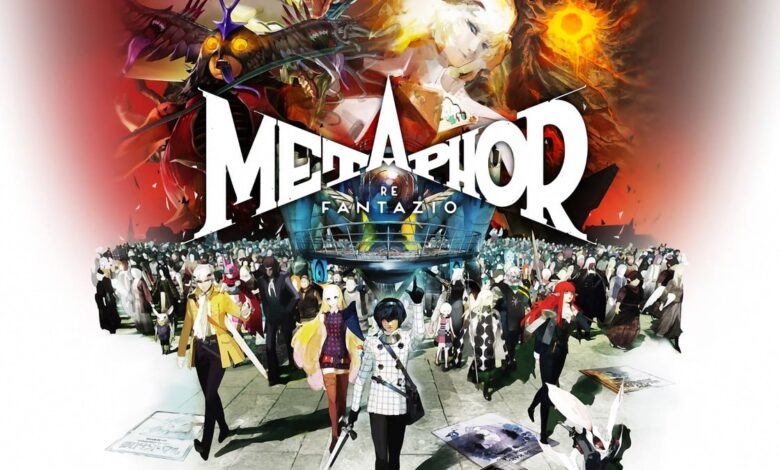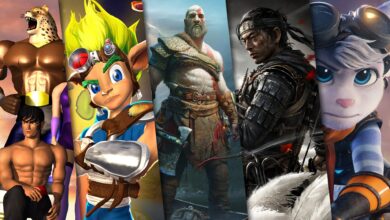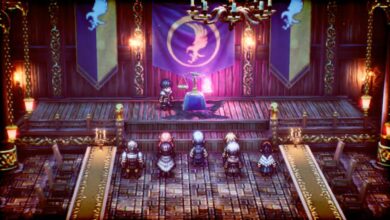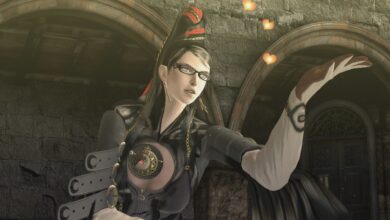The Metaphor: ReFantazio Story Fell Flat for Me

Metaphor: ReFantazio is a booming success for Atlus, with plenty of good reviews and sales milestones hit almost immediately after its official release. But with so many things from the game nagging at me, I find it difficult to partake in the celebrations. While the ultimate message is well-meaning, it’s delivered in such a tepid and messy narrative that even now, I struggle to care about or even remember what it has to say.
This article contains heavy spoilers for the entire story of Metaphor: ReFantazio.
Before we begin, I’d like to reiterate that this is my personal opinion on why the story in Metaphor: ReFantazio didn’t work. If you enjoyed the story, then great. I’m happy for you, genuinely. I would love to hear why you liked it, because I have no idea what redeeming quality people are finding in the narrative. Nonetheless, lots of people saw what I couldn’t, considering the slew of perfect scores other sites gave it. While I gave it an 8—a high score in retrospect, whereas some noted that it was a “low” one—the more I think about it, the more I believe that I was being far too generous as a result of the battle system and music.
For starters, without talking about the themes, the pacing of the story in Metaphor: ReFantazio was awful. It feels like you spend lots of time with Strohl, Hulkenberg, and Heismay. But Junah, Eupha, and Basilio join, and they jump right into business. The story doesn’t dedicate as much time, fluff, or events into giving them depth or showing how they interact with the others. It leads to them feeling a little out of place in the overall party dynamic.

Basilio getting his awakening scene after the grand moment when he and Fidelio protect innocent children and Fidelio dies in his arms was such a weird creative choice. The ghost fist bump was a neat touch though. The revelation of what Rella did to the prince, as well as her death, elicited no emotion from me either. I don’t know this girl, nor do I particularly care about her relationship to Junah. If I felt anything, it was surprise that she was revealing her crimes so quickly. The pacing from Louis’ soiree forth felt insanely rushed and off, and I don’t really understand what could’ve happened behind the scenes for the story to end up this way.
Louis remaining the sole main antagonist was also a bit of a surprise. He really felt like someone who would be a first act boss and then disappear to make room for a more dangerous foe. Nothing really wrong with Louis being a constant antagonist, outside of the fact that for the most part, he wasn’t very interesting. As per usual with Atlus games, story beats and themes are introduced and then discarded without much time on them. The Protagonist turning into a monster, the Protagonist merging with the prince, and Louis being elda are some major revelations in the last act that the game glosses over. They don’t get anywhere near the appropriate narrative weight.
In my review, I mentioned that it reminded me of Zootopia. This was due to similarities in how if you spend even a second thinking about the world, the allegory falls apart. As well, the Japanese audience ate it up as a “perfect” analogy of real-world politics but still dolled up in a fun family-friendly film. The more I think about Metaphor: ReFantazio, the more I realize how apt I was with that comparison because under even a little scrutiny, it’s easy to see just how shallow the world of Metaphor is. In fact, I’m willing to say that Zootopia presented a more interesting world than Metaphor did.

Euchronia is not a compelling setting at all. The world of Metaphor is akin to a cardboard cutout. It exists solely as a backdrop to discuss racism and discrimination, yet there’s no real structure or depth to it to make said racism or discrimination work. Look at Zootopia and try to picture the titular city beyond what was in the film. There’s enough lore and thought put into it that you can imagine how the animals live, how the city works, and how the society functions. The same goes with other fantasy worlds, even in gacha games like Genshin Impact or Honkai: Star Rail. The fiction feels alive, even when you turn off the screen. While I praised the individual cities of Euchronia for how distinct they felt, the entire country itself feels like nothing more than a convenient prop.
Now let’s delve a little deeper into the narrative Atlus gives us. The game presents us with two favorites for the crown: Sanctifex Forden and Count Louis. The Protagonist is one too, thanks to the visions of a united world under the prince’s rule, but the people don’t really give him the time of day until the halfway point. Under Forden, the system would remain the same as it’s always been, with preferential treatment for nobles and devout Sanctists.
Meanwhile, Louis means to set up a meritocracy in which those with strength—and only those with strength—deserve to live. Neither of them are trying to bring about a world or society that seems genuinely helpful for the people, thus leaving no real moral quandary as to whether or not they’re in the right. The Protagonist’s vision of a fair and united world, free of discrimination based on your birth, is very idealistic and all. But at no point does he or the party members actually say how they’re going to do bring that about.
It seems that for most of the game, those kinds of logistics will come later, after they restore the prince to the throne. Unfortunately, the prince never wakes up, technically speaking, and he simply merges back with the Protagonist. This means that we never get to actually hear how the Protagonist will solve any of the ongoing issues in the game. Him being a silent protagonist contributes to this problem, but I’ll touch on that later.

I personally prefer stories, if they’re going to tackle such difficult themes, to present a real trolley problem of sorts. In Persona 5 Royal—which I no longer have qualms about comparing Metaphor: ReFantazio to since Atlus was pulling our legs when it said that Metaphor: ReFantazio would be different—Maruki presented a really interesting choice. Stay in a dream world where all the bad things in your life didn’t happen, or choose to face the more bitter and painful reality? While the game presents the latter as the right one, it’s hard to argue against the former. If such a choice existed, would you be so quick to discard it?
There’s never any question in the game in regards to Forden or Louis. Forden ruling the country would be bad, but Louis ruling the country would be bad too. Ergo, the only one who can and should rule it is you, or the prince. Well, let’s look at how the Protagonist interacts with people to see how they’d better the world. Whenever you talk to an NPC in the game, they start out quite hostile and prejudiced. But if you’re nice, the NPC gives some excuse for their bad behavior and then becomes much friendlier. Perhaps Atlus wanted to use this to show that not everyone is a bad person at heart. But it just feels lazy. Do I want the characters to be mean and racist to me? No. However, if that’s going to be in the game in the first place, why resolve it this quickly?
I feel like a huge part of why the discrimination thing doesn’t work for me personally is that it doesn’t feel real. It feels very forced and informed. In my review, I chalked this feeling up to everyone being really humanoid save for the eugiefs, but now that I’ve had more time to compile my thoughts, I think I know why. It doesn’t feel organic. Think about the cultures and races in real life that have a bad reputation. There should be some stereotype that gets repeated a lot, right? Whether it has to do with bad apples, cuisine, or a physical characteristic, there’s some reason as to why they’re viewed with a lot more disdain than others.
As a Chinese person, I’ll list a few: we eat anything and everything, we’re loud, we’re cheap, we’re colorist, and so on and so forth. Is there real grounds for all of that? I mean, yeah, kind of. Some Chinese people practically yell at each other in public, and everyone uses the “HoYoVerse is a Chinese company and the beauty standards favor pale skin!” excuse when people want to discuss the lack of darker-skinned characters. The historical bad blood between nations like China and Japan can also lead to prejudice among the population. There’s a distinct lack of that kind of stuff in Metaphor: ReFantazio, outside of some mean-spirited comments about physical appearance. The one time I opened up the memorandum in game was to look at the races and see why certain races are “lesser” than others, because the story made it impossible to understand. That’s not great.

The themes of prejudice and racism never feel impactful because you see it in such an artificial setting. That it never evolves beyond racism and religious fervor is kind of ridiculous too. So there’s no ageism or sexism? No discrimination against people with disabilities? It’s not as if the game is solely about racism either; it’s technically about anxiety. There are so many things they could’ve done to add onto it and still keep the themes of injustice though. For example, Maria is half-blooded, and while she deals with people calling her a weirdo, the issue of her not being ishkian or rhoag enough doesn’t come up. This is a very common struggle that people from two heritages face. Her being ousted as a “freak” feels so similar to all of the other stories in Metaphor that it would be nice if Maria’s social link introduced yet another angle.
Another thing that makes the setting seem thoughtless is that there’s no one even attempting to pass, yet prejudice is such a large part of it. You mean to tell me that Louis is the only person in the entire course of history who thought to fake clemar heritage? No paripus thought to simply wear a shawl and baggy clothing, put on some face make-up, and pretend they’re a prudish rhoag? The Protagonist is an elda—a tribe so rare some don’t believe they exist yet somehow everyone recognizes you as one. Elda also have no defining racial traits, making them quite the blank canvas. Gallica tells you to keep your head down in Grand Trad, but the thought of using fake horns or ears never crossed her mind?
These are topics and questions that might’ve or should’ve come up during the conceptual stage. This game was in development for so long, but I wonder how much of it Atlus had to scrap and cut away. I also wonder how much of it was executive meddling forcing the development team to keep a lot of these Persona elements. It certainly doesn’t feel like they spent as much time as they needed to create a whole new fantasy setting. How can I care about a world and characters that hardly feel like a world and characters?

It’s clear from all angles that a writer who is in his country’s majority wrote the story. That’s not anything Hashino can fix, but he could’ve certainly done more research. Foreigners, citizens of non-Japanese descent, and multiracial people all deal with prejudice. Considering Japan’s culture of conformity, I’m sure that Hashino or someone else could’ve found some people talking about their experiences online in order to add some grounded nuance to the tale. The racism in the game is either allegorical in nature (intentional or not) or cartoonishly blatant. I’m glad that it included more realistic scenes like how one’s race affects their job prospects, at least.
During the last act of the game, the narrative shifts slightly to focus on themes of anxiety. Anxiety and fear in real life can manifest as prejudice and racism, for sure, but it feels like it came out of nowhere. The ultimate theme of how anxiety is the cause of all the problems feels really incongruent with the set-up thus far. I don’t believe that the party came together because the Protagonist soothed their anxieties. It feels like they all unite behind the Protagonist because he’s open to listening to them and understanding them.
In my opinion, the awakening sequence, in which characters rip out their heart and it’s a mic and they give a speech into it, plays really well with that idea. Eupha’s and Maria’s social links, while a little heavy-handed with the writing, also work well in that it presents the usual discrimination problem, but the way they go about overcoming it and befriending their neighbor feels a lot more realistic than what was in the main story. It might be a little cheesy with how overly sincere it is. But considering how heavy-handed Metaphor: ReFantazio is as a whole, that’s not a bad thing.

So why in the world is the game like this? What could be the cause? To give a short answer, I think the longer Atlus spends on a game, the more the story suffers for it in exchange for sheer “fun” value. Honestly though, I think part of the issue is the Persona gameplay loop. The calendar system naturally limits what you can do with the narrative. Not only is this due to player freedom, but it also sets an arbitrary limit on patience. It can be frustrating when the game eats away at your “time” with too many days that railroad you into doing the main plot. This works in, say, Persona, because the world in Persona is our own. But in a fantasy world like Metaphor: ReFantazio and with a story that’s so reliant on worldbuilding, it’s a double-edged sword.
The player simultaneously has too much and not enough control. The social links also work against it because there’s a lot of important information in them that someone might not get to. The paripus igniter experiments, for example, seems like a major incident in the history of the world and is a very interesting bit of lore. The effects it had on paripus may have also contributed to the overarching in-game reception of the race. But because the details and aftereffects are stuck behind Basilio’s story, some players may not see it in their first playthrough. Junah’s past as a slave is something that seems important to her character and how she grew up with Rella after that would be a great way to make you care about them both. Yet this is trapped behind Junah’s social link, which barely gets into that anyway.
Metaphor: ReFantazio should’ve done away with the Persona gameplay loop of story, then a long objective with a deadline, and then more story. It should’ve just stuck with a more conventional JRPG narrative structure. This way, they can make sure all players are on the same schedule, receiving the same information and experiencing the same story. It also leaves Atlus free to add more if it pleased, since there’s no longer the worry that players would be scrambling to meet deadlines. This is an interesting attempt, for sure. But with so much going on and so much that it needed to convey to the player, it should’ve exercised more control rather than letting people do whatever they wanted whenever they wanted. Yes, there are some segments when the game railroads you into certain activities, but that’s only a fraction of the story.

Speaking of Junah and Basilio, the final three party members feel like glorified tagalongs in the main story half the time. Everything interesting about them are behind their links. While Heismay, Strohl, and Hulkenberg also have their own separate arcs, the story does enough to present them in an endearing way. My favorite scene is when the Protagonist, Strohl, and Hulkenberg are banging their pots and pans, and they’re yelling their frustrations at each other and the situation, much to Strohl and Hulkenberg’s chagrin. Then, Heismay comes wobbling out more like an annoyed neighbor than a wanted criminal. His behavior as a captive made me like him a lot too. It makes sense that they’d hang around with the Protagonist, and they get enough scenes or dialogue that they feel like well-rounded characters even if you don’t do their links.
On the other hand, Junah, Eupha, and Basilio felt like Haru in Persona 5 where they join after the story accelerates to the point that’s the only thing we focus on. I already mentioned how little I cared about Junah and Rella, as well as what could’ve been done to ameliorate that. Basilio gets it better because we got to know him and Fidelio prior. Meanwhile, Eupha’s entire experience outside of the island is behind her social link, making her feel like an accomplice who exists only for the Louis assassination. Again, a simple fix to this is to make their social links part of the main story or as optional side quests, and without a calendar system that may lock you out. The paripus stuff, as well as Junah’s past, all feel important to the themes and world, so why risk people missing them?
Yet another culprit that ties into the Persona gameplay loop is the lack of meaningful side quests. There are a lot of side quests that boil down to people being in trouble because of X monster in Y dungeon, so you have to go and slay said creature. They’re similar to Mementos requests from Persona 5, which would be fine if the world wasn’t a fantasy world separate from ours. Side quests could flesh out the characters, the setting, and the themes some more. Think about all the side quests from Nier Automata that do exactly that. It’s one more element of the game that, through under-utilization, lends to the entire world lacking any interesting depth. And if the world isn’t interesting, the story and characters that take place in that setting naturally feel pretty bland as well.

Finally, the Protagonist being a silent protagonist doesn’t really work in Metaphor. I’ve mentioned my distaste for this trope before, but I really mean it this time. Characters like Maria, Eupha, and Catherina all present a way in which the people can work together to overcome social inequality and injustice. It’s nice to see. The problem is that their scenes are, again, trapped behind social links. The main story does little in presenting an alternative to solely relying on a monarch to enact change. The Protagonist provides no solutions to any of the issues the game poses outside of referencing More’s novel. He’s a cute little airhead, but he can be a cute airhead and still be his own character. Considering the themes the game wants to tackle, the protagonist lacking any ideals of his own, serving more like a yes-man to others, is really unfortunate.
It’s common knowledge among writers that one of the worst things a reader can think is: “I don’t care what happens to these people.” I hate to say it, but for half of the time I was playing Metaphor, I was thinking that word for word. The people in Euchronia, outside of the misfits you hang out with in social links, are wishy-washy sheeple who spend more time complaining than they do thinking. Hmm, kind of like the citizens in Persona 5. Half of my party consists of people I don’t really know. Louis’s motivations for wanting to rule the kingdom under Darwinian laws aren’t very compelling. Heck, even Thanos had a more interesting reason than he did. Did I still like the game? I mean, yeah, it’s a fun game. But an RPG is more than just its battle system.
I admit that I’m quite critical of Atlus writing, and director Hashino in particular. However, I never scrutinized, say, Persona 3 with the same vigor I did Persona 5. It’s because of the difference in thematic scope. Persona 5, like Metaphor: ReFantazio, wants to commentate on the world and society as a whole. And the problem is that Hashino’s takes are simply not that good or revolutionary. So many story beats and themes in Metaphor derived from ground Persona 5 already tread. The setting was what Atlus needed to really draw a line between the two and unfortunately, the writers dropped the ball. Metaphor: ReFantazio was at its best when it focused entirely on the fantasy epic and while I’m not denying real-world politics’ place in fiction, it’s more effective when the creator presents something substantial, rather than repeating empty ideals and platitudes.
Metaphor: ReFantazio is readily available on the PS4, PS5, Windows PC, and Xbox Series X.




